Overview
The article presents seven innovative sustainable packaging solutions for nutraceuticals, encompassing recyclable, biodegradable, compostable, and refillable options. These alternatives address the escalating consumer demand for eco-friendly products.
By adopting these materials and practices, companies can significantly enhance their market presence, mitigate environmental impact, and cultivate customer loyalty. This is underscored by compelling statistics that reveal a pronounced preference for sustainable packaging among consumers.
As the industry evolves, embracing these solutions is not just beneficial; it is essential for maintaining a competitive edge.
Introduction
The increasing awareness of environmental issues has significantly driven the demand for sustainable packaging solutions, especially within the nutraceutical sector. As consumers progressively prioritize eco-friendly practices, brands are presented with a distinctive opportunity to elevate their market presence while positively impacting the planet. Yet, a critical question persists: how can companies effectively innovate their packaging strategies to fulfill both consumer expectations and sustainability objectives?
This article delves into seven innovative sustainable packaging solutions that not only address these pressing concerns but also lay the groundwork for a more responsible future in the nutraceutical industry.
Western Packaging: Integrated Sustainable Packaging Solutions for Enhanced Efficiency
Western Packaging distinguishes itself in the nutraceutical sector by delivering sustainable solutions that enhance operational efficiency and reduce environmental impact. Their approach seamlessly integrates expert container design, tailored filling services, and comprehensive third-party logistics (3PL), creating a cohesive system that meets client demands while adhering to sustainable practices. By prioritizing innovative materials and processes, Western Packaging empowers businesses to strengthen their market presence while effectively minimizing waste and resource consumption.
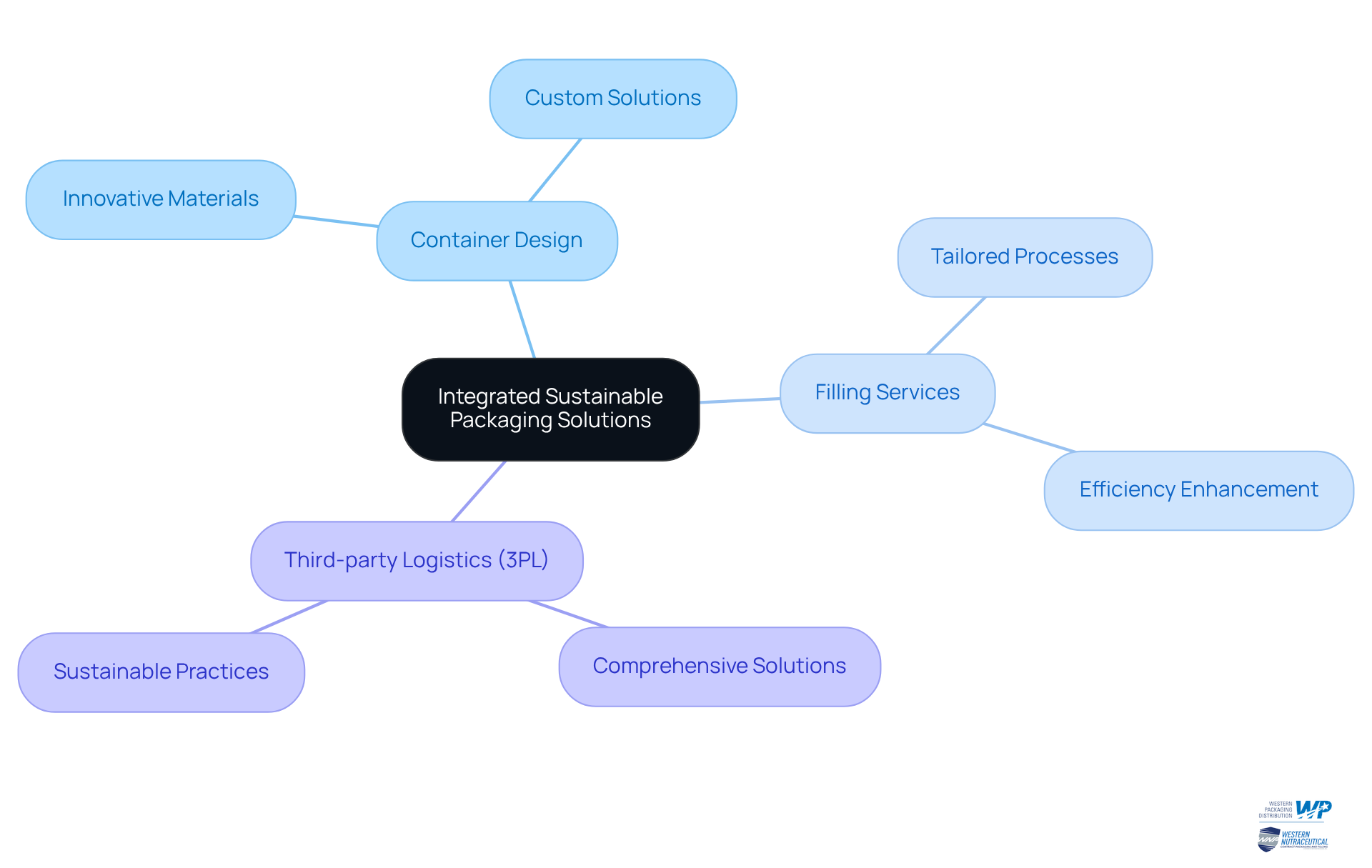
Sabert: Innovative Foodservice Packaging Solutions Reducing Environmental Impact
Sabert stands at the forefront of innovative sustainable packaging for foodservice container solutions, renowned for its commitment to eco-friendliness. Their products are meticulously designed with innovative sustainable packaging to minimize environmental impact, utilizing recyclable and compostable materials. This focus not only addresses the practical needs of today’s consumers but also empowers businesses to meet their sustainability goals. As a pivotal ally in the nutraceutical and foodservice sectors, Sabert reinforces its position as a leader in the industry by providing innovative sustainable packaging solutions that align with ecological objectives.
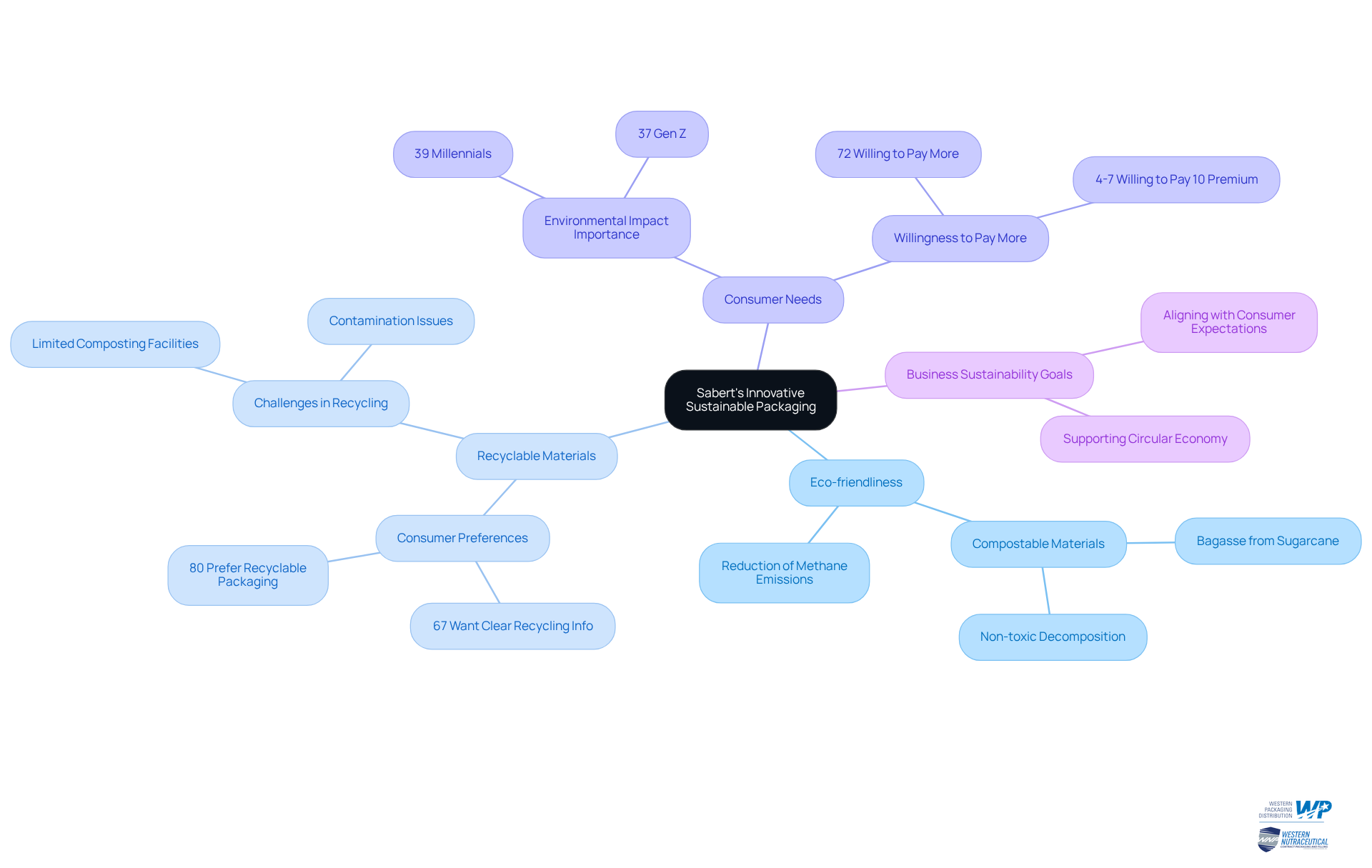
Recyclable Packaging: A Key Trend in Sustainable Solutions for Modern Brands
Recyclable packaging is now considered innovative sustainable packaging and has emerged as a pivotal trend among contemporary brands striving to bolster their eco-friendly credentials. By utilizing innovative sustainable packaging made from easily recyclable materials, companies not only reduce waste but also attract environmentally conscious consumers. This trend is particularly pronounced in the nutraceutical industry, where 61% of U.S. consumers consider sustainability in their purchasing decisions. Brands that embrace recyclable materials can significantly enhance their market presence and foster customer loyalty.
Statistics reveal that:
- 90% of shoppers are more likely to purchase from brands offering eco-friendly containers.
- 39% have switched to competing brands due to their commitment to recyclable alternatives.
Numerous successful examples exist, such as E.l.f. Cosmetics, which has eliminated over 1 million pounds of materials by optimizing its processes, showcasing how eco-friendliness can improve operational efficiency and draw in consumers.
Experts underscore the importance of clear sustainability communication, with:
- 70% of consumers preferring containers that feature transparent sustainability labels.
- 53% of shoppers willing to pay the same premium for sustainably packaged products, reflecting a readiness to invest in eco-friendly options.
As the demand for innovative sustainable packaging continues to escalate, companies that prioritize recyclable materials are not only meeting consumer expectations but also positioning themselves for long-term success in a competitive marketplace.
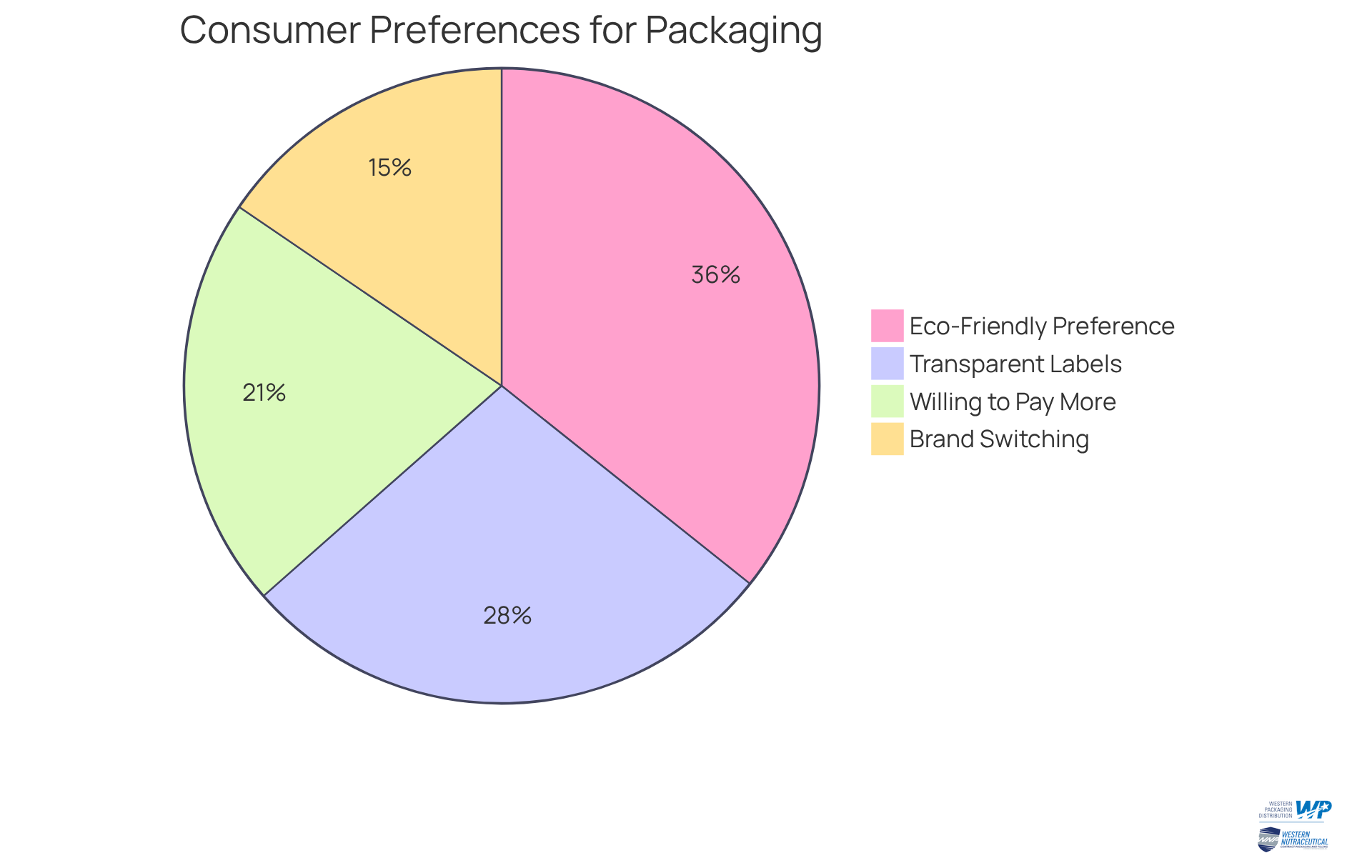
Biodegradable Packaging: Transforming Waste Management in the Packaging Industry
Biodegradable materials are revolutionizing waste management in the industry by offering a sustainable alternative to conventional plastics. These materials decompose naturally, significantly reducing contributions to landfills and environmental pollution. For nutraceutical companies, the transition to innovative sustainable packaging not only addresses regulatory demands but also attracts a growing clientele that prioritizes eco-friendliness. Research indicates that 71% of shoppers are willing to switch brands for enhanced sustainability efforts, underscoring the opportunity for increased brand loyalty through environmentally friendly initiatives.
Brands like Applegate Farms and Olipop exemplify this transformation, effectively integrating biodegradable materials into their operational strategies. Applegate Farms has adopted eco-friendly practices that not only meet customer expectations but also strengthen retail partnerships and enhance market share. Similarly, Olipop's focus on health-oriented products has led to a remarkable 340% year-over-year revenue growth, showcasing the market potential of sustainable packaging solutions.
The benefits of biodegradable packaging extend beyond compliance and market appeal; they also cultivate a positive company image. As consumers become increasingly aware of ecological issues, companies that excel in innovative sustainable packaging position themselves as leaders within their industry. By embracing biodegradable solutions, nutraceutical companies can forge deeper connections with eco-conscious consumers, ultimately driving growth and enhancing their market presence.
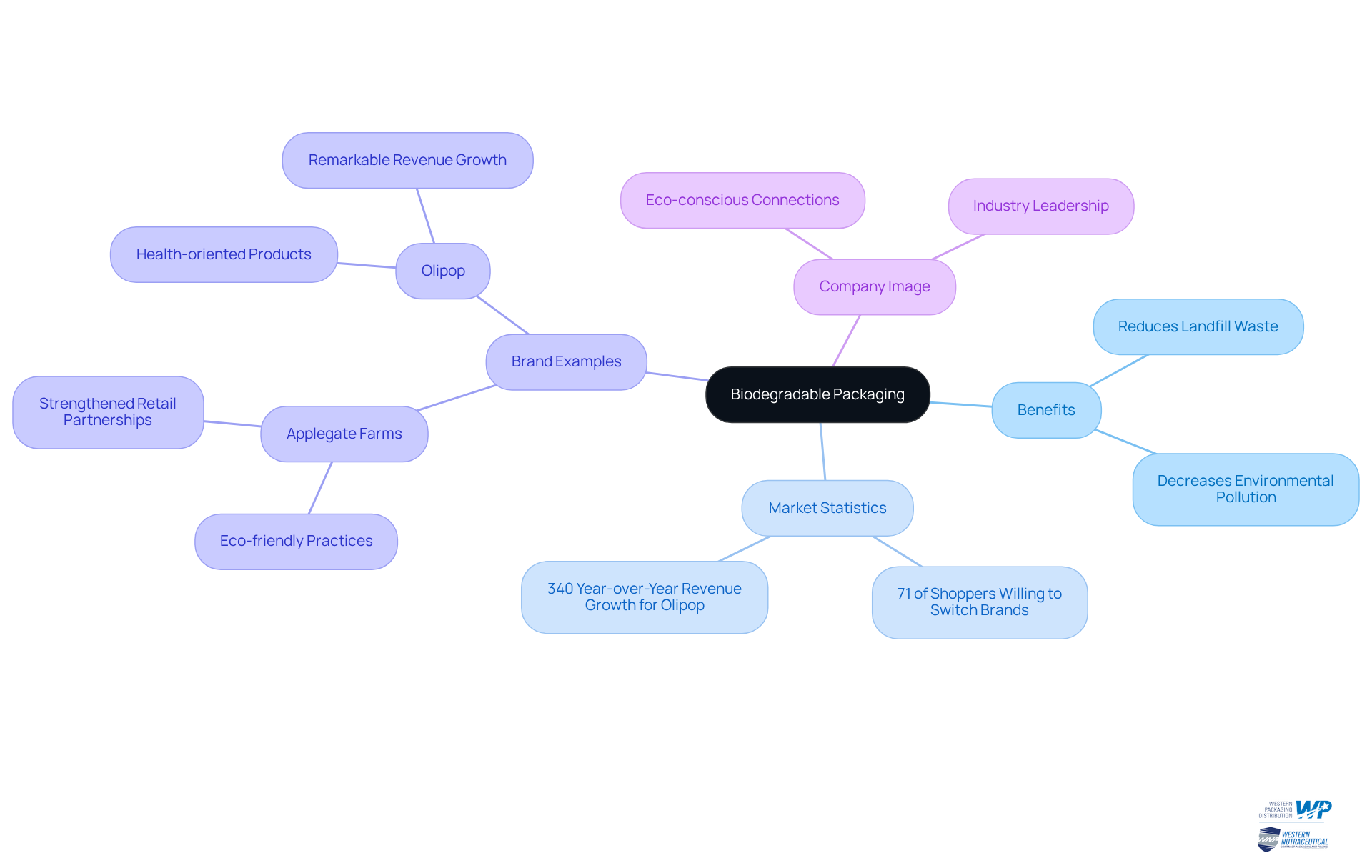
Compostable Packaging: A Sustainable Alternative for Eco-Friendly Brands
Compostable materials serve as an innovative sustainable packaging option for brands determined to reduce their environmental footprint. Composed of organic materials, this form of wrapping decomposes into nutrient-rich compost, enriching the soil rather than contributing to landfill waste. Notably, 60% of North American buyers express concern regarding waste, while 73% of individuals globally indicate they would likely alter their consumption habits to mitigate their environmental impact.
For nutraceutical firms, adopting compostable materials resonates with health-conscious consumers who prioritize eco-friendliness in their purchasing decisions, as 39% are motivated by environmentally-friendly factors. This alignment not only bolsters brand reputation but also cultivates customer loyalty, evidenced by the trend of sustainability-marketed products outpacing conventional options in over 90% of consumer packaged goods categories.
Successful examples abound, such as the case study on waste reduction through innovative sustainable packaging, where companies have effectively leveraged compostable materials to enhance their eco-friendly credentials. This underscores that ecological responsibility is not merely an add-on but a fundamental aspect of contemporary health products.
Nutraceutical firms are encouraged to consult with labeling specialists regarding eco-friendly label material selections to reinforce their commitment to environmental responsibility.
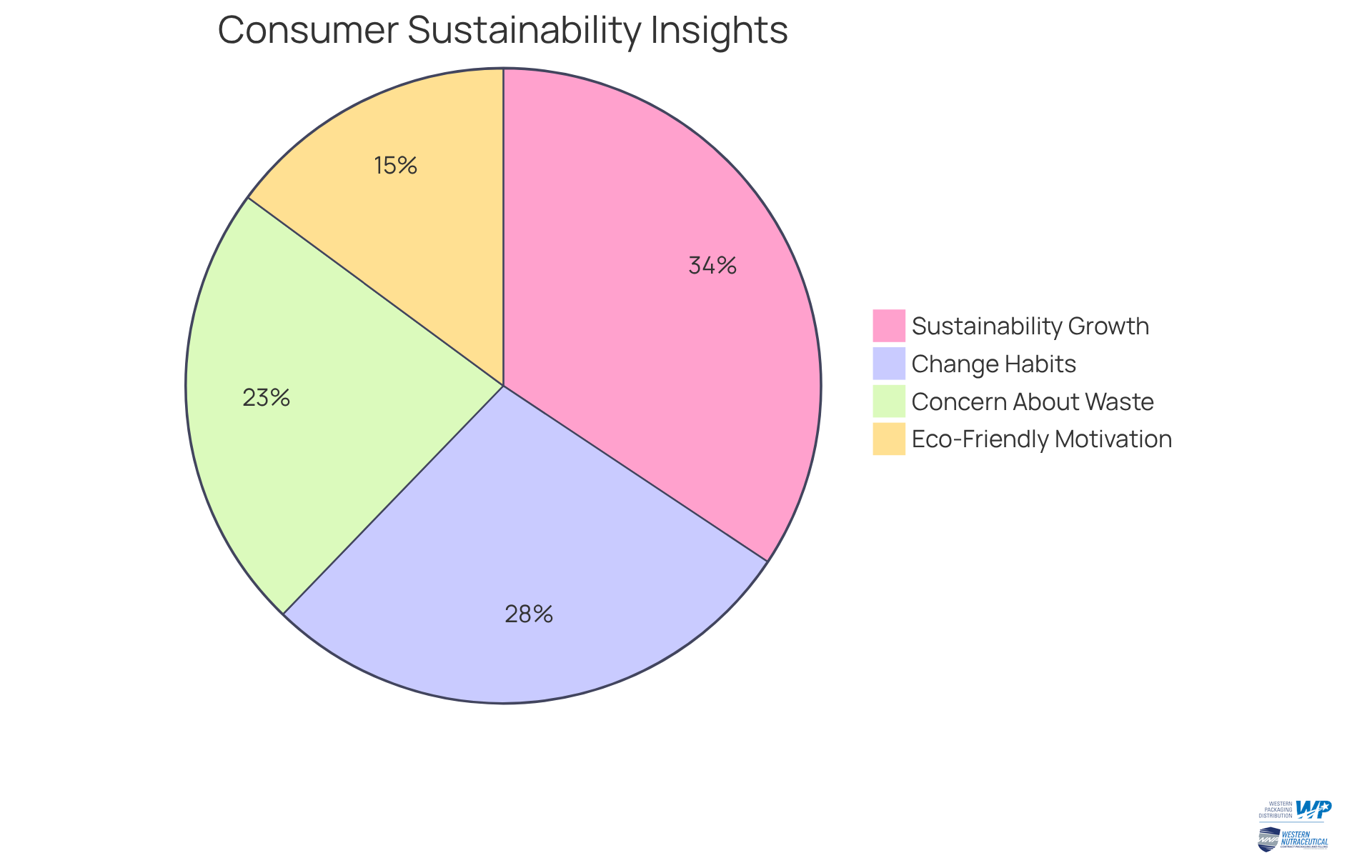
Innovative Materials: Replacing Plastics in Sustainable Packaging Solutions
The shift to innovative sustainable packaging solutions is driving the emergence of new materials that effectively replace conventional plastics. Plant-based bioplastics, alongside recycled paper products, are gaining traction due to their comparable functionality and reduced environmental footprint.
For nutraceutical companies, the incorporation of innovative sustainable packaging not only enhances product attractiveness but also meets the rising public demand for eco-friendliness. This alignment with eco-friendly practices can significantly enhance market share, as evidenced by the plant-based packaging market, valued at USD 5.36 billion in 2023 and projected to exceed USD 10 billion by 2032.
Numerous successful instances exist, with brands utilizing plant-based bioplastics to reinforce their commitment to environmental responsibility, thereby improving brand image and consumer loyalty.
Industry experts note that the pursuit of sustainability goals is a primary driver for adopting innovative sustainable packaging materials, despite challenges such as higher production costs and limited availability.
The market for plant-derived bioplastics is anticipated to expand at a compound annual growth rate (CAGR) of over 9% from 2024 to 2032, indicating a substantial transition towards environmentally friendly solutions in the nutraceutical sector.
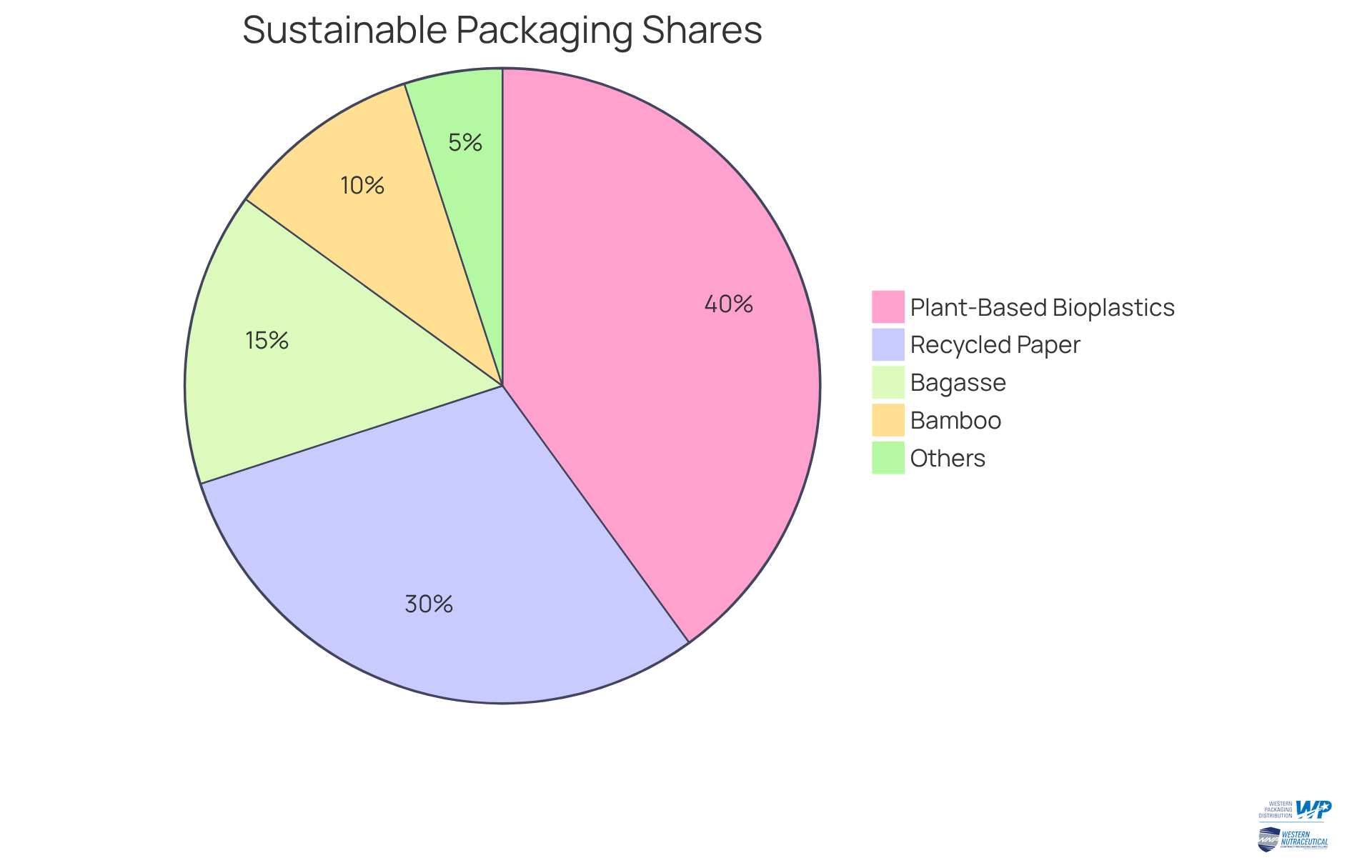
Flexible Packaging: Versatile Solutions for Sustainable Product Offerings
Flexible materials are emerging as a pivotal solution for innovative sustainable packaging in sustainable product offerings, particularly in the nutraceutical sector. This innovative container type is lightweight, minimizing material usage and reducing transportation costs and environmental impact. By incorporating recyclable or biodegradable materials, adaptable wrapping aligns with the increasing public demand for sustainability. In fact, 70% of buyers prioritize shelf life in containers, and flexible options excel in preserving product freshness while addressing concerns about plastic waste. Moreover, hygiene and food safety are highly significant traits for product containers, further reinforcing the argument for flexible solutions.
Furthermore, adaptable wrapping enhances user convenience, facilitating the utilization and storage of items. Brands that embrace this container solution can significantly enhance their operational efficiency, as it often requires less energy to produce compared to conventional methods. Successful examples include companies that have optimized their supply chains and lowered expenses by using innovative sustainable packaging like recyclable pouches and films, which fulfill environmental objectives while appealing to eco-conscious consumers. For instance, advancements in food containers, including compostable materials and those created from agricultural byproducts, illustrate how companies can successfully improve their eco-friendly initiatives.
As the demand for eco-friendly containers continues to expand, with forecasts predicting a compound annual growth rate of 7.67% from 2024 to 2029, nutraceutical brands that adopt flexible containers will likely improve their market visibility and operational effectiveness while making a positive impact on environmental conservation. Items with transparent ecological credentials are surpassing their counterparts, suggesting that environmental responsibility is not merely a trend but an essential element in buying choices. As McKinsey states, "Consumers care about sustainability—and back it up with their wallets.
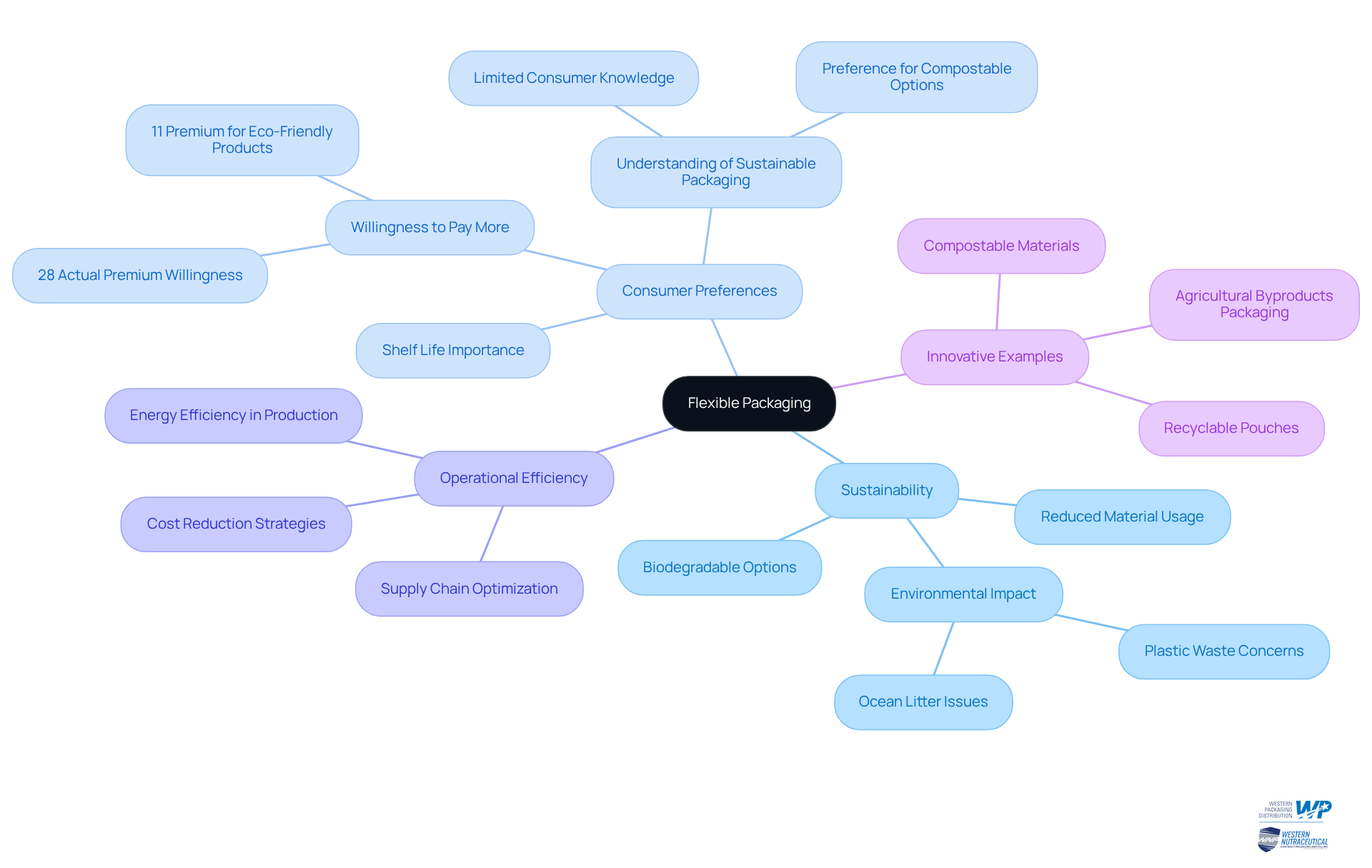
Refillable Packaging: Meeting Consumer Demand for Sustainability
Refillable packaging is emerging as a preferred solution to meet the public's demand for eco-friendliness. By enabling consumers to refill their containers, companies can significantly reduce waste and promote a circular economy. This approach not only attracts environmentally conscious consumers but also fosters brand loyalty, as customers appreciate a commitment to sustainability. For nutraceutical firms, embracing refillable containers can enhance market presence and resonate with consumer values, ultimately positioning these companies as leaders in sustainable practices.
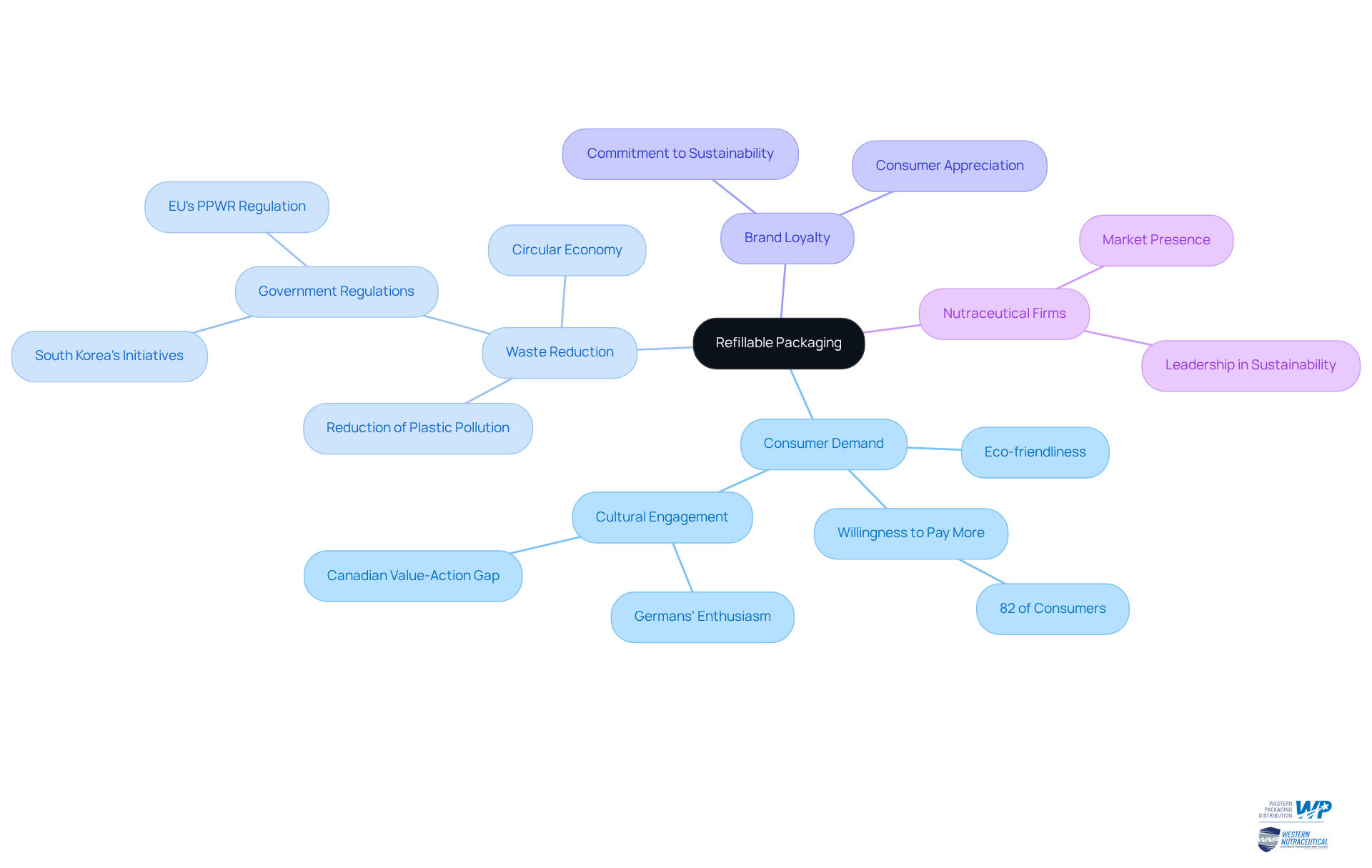
Digital Tools: Enhancing Efficiency in Sustainable Packaging Innovations
Digital tools are revolutionizing the development of innovative sustainable packaging solutions for products, particularly within the nutraceutical sector. Technologies such as 3D printing, digital prototyping, and intelligent wrapping solutions empower brands to refine their design concepts while significantly reducing waste. For instance, 3D printing facilitates the creation of customized containers that meet specific product requirements, leading to improved efficiency and sustainability. Companies like Aquafina have effectively integrated advanced technologies into their wrapping strategies, demonstrating how digital solutions can foster responsible consumption habits and mitigate environmental impact. Notably, Vietnam generates 3.7 million tons of plastic waste annually, with only 10 to 15 percent being recycled, underscoring the urgent need for innovative sustainable packaging solutions.
The impact of 3D printing on container efficiency is substantial, as it streamlines production processes and minimizes material usage. This technology not only cuts costs but also aligns with the increasing consumer demand for innovative sustainable packaging solutions. As graphic designer Joe Soprano aptly states, "Good design is obvious. Excellent design is clear," highlighting the importance of wrapping that effectively communicates eco-friendliness.
Moreover, successful examples of companies utilizing 3D printing for eco-friendly containers showcase its potential. By embracing innovative sustainable packaging practices, nutraceutical brands can enhance their product offerings and connect with eco-conscious consumers, ultimately driving market growth and reinforcing their commitment to sustainability. To implement these technologies, nutraceutical manufacturers should consider investing in digital prototyping tools and exploring partnerships with 3D printing specialists to develop customized container solutions.
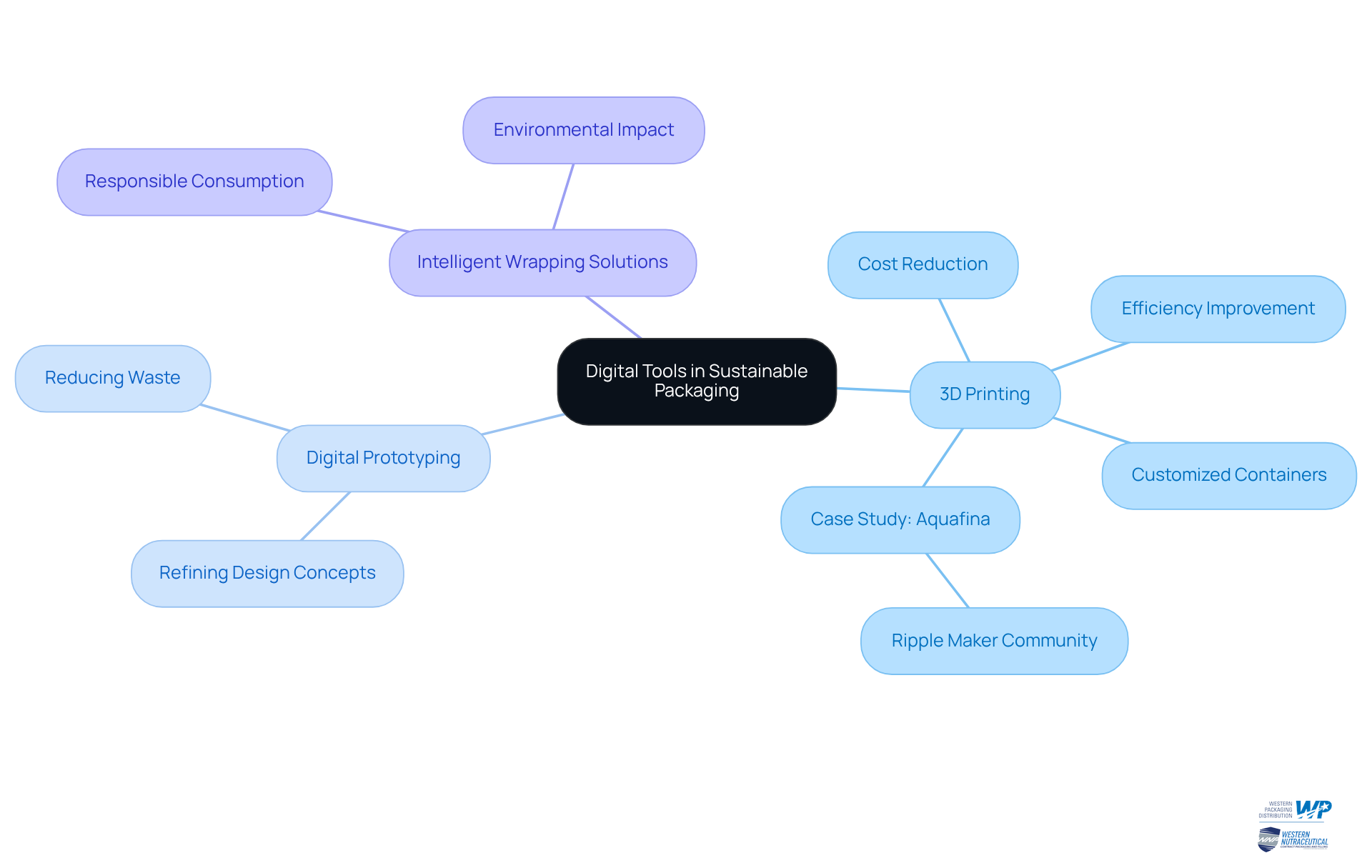
Collaboration Across Industries: Driving Sustainable Packaging Innovations
Cooperation among sectors is essential for promoting sustainable innovations in materials. By forming strategic partnerships with material suppliers, technology providers, and other stakeholders, nutraceutical brands can develop cutting-edge solutions that effectively tackle environmental challenges. Successful partnerships have led to the redesign of container materials utilizing mono-materials, simplifying recycling processes while preserving structural integrity. This approach not only meets consumer demands for sustainability but also aligns with broader environmental goals.
Participating in these joint initiatives cultivates a sense of community and collective responsibility among industry stakeholders, propelling the creation of innovative solutions that enhance both product appeal and ecological impact. As David Feber, a partner in McKinsey’s Detroit office, states, "To truly achieve significant progress toward sustainable solutions, modifications to the broader containers and recycling system will be required." This underscores the necessity of collective action in addressing the pressing issues of plastic pollution and waste management. By leveraging the strengths of various stakeholders, nutraceutical companies can significantly contribute to a more sustainable packaging landscape.
To maximize the benefits of collaboration, nutraceutical manufacturers are encouraged to actively seek partnerships with like-minded organizations and participate in industry forums focused on sustainability initiatives. This proactive approach can lead to innovative solutions that not only enhance market competitiveness but also promote a healthier planet.
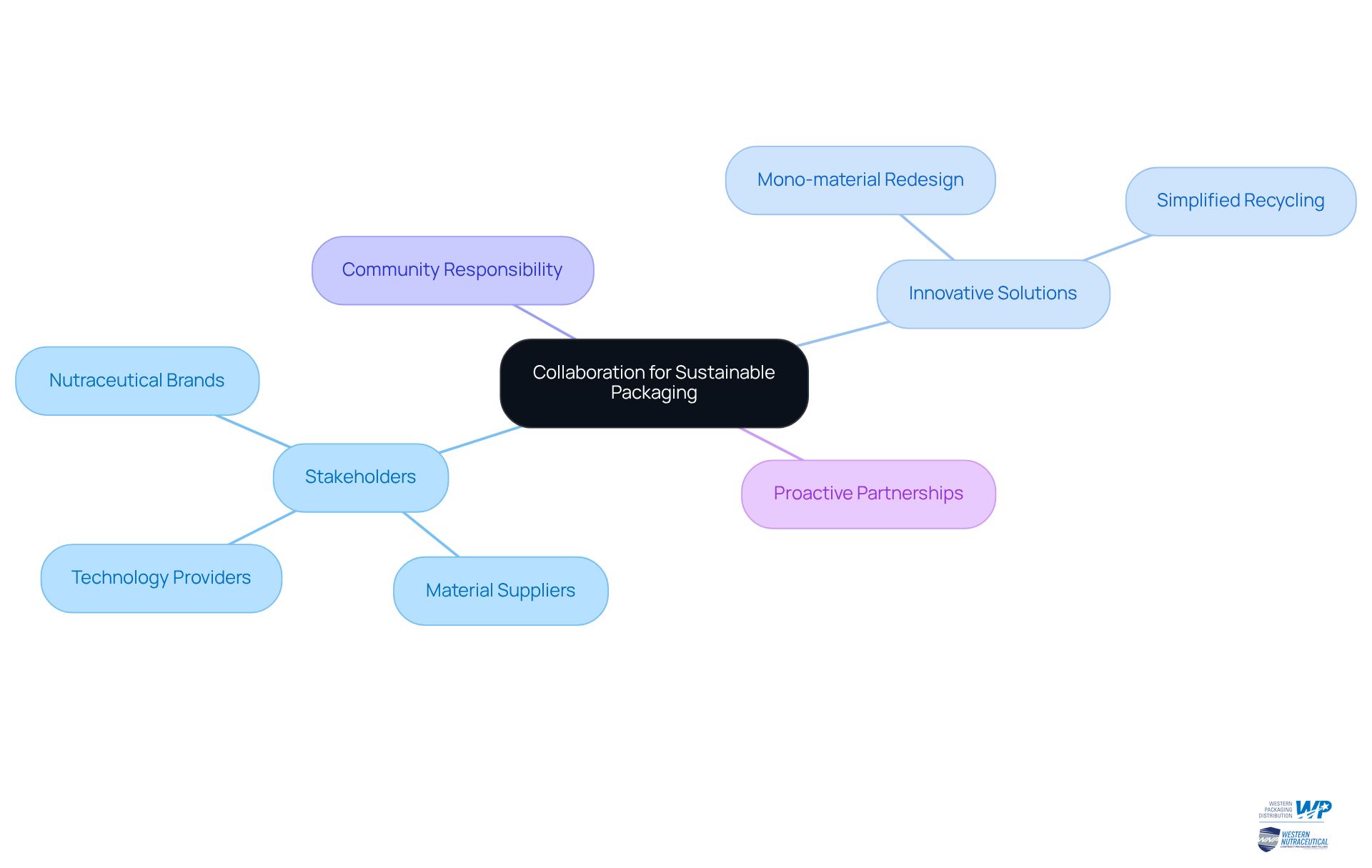
Conclusion
The exploration of innovative sustainable packaging solutions for nutraceuticals signifies a transformative shift in how companies approach their environmental responsibilities. By integrating eco-friendly materials and practices, businesses enhance operational efficiency while aligning with the growing consumer demand for sustainability. This commitment transcends mere trend; it is a strategic imperative that significantly influences market presence and brand loyalty.
Key insights from the article underscore the various sustainable packaging options available, including:
- Recyclable materials
- Biodegradable materials
- Compostable materials
- Refillable materials
Each solution offers unique benefits that cater to both environmental goals and consumer preferences. The importance of collaboration across industries, alongside the adoption of digital tools, further highlights the potential for innovation in this space. This approach enables companies to create effective and efficient packaging systems that resonate with eco-conscious consumers.
Ultimately, the future of nutraceutical packaging hinges on brands' ability to embrace these sustainable practices. As consumer awareness and preferences evolve, companies prioritizing eco-friendly packaging solutions will not only meet regulatory demands but also foster deeper connections with their customers. The call to action is clear: by investing in sustainable packaging innovations, businesses can contribute to a healthier planet while simultaneously driving growth and enhancing their competitive edge in the marketplace.
Frequently Asked Questions
What distinguishes Western Packaging in the nutraceutical sector?
Western Packaging is distinguished by its delivery of sustainable solutions that enhance operational efficiency and reduce environmental impact through integrated expert container design, tailored filling services, and comprehensive third-party logistics (3PL).
How does Western Packaging contribute to sustainability?
Western Packaging prioritizes innovative materials and processes to empower businesses to strengthen their market presence while effectively minimizing waste and resource consumption.
What is Sabert known for in the foodservice packaging sector?
Sabert is known for its innovative sustainable packaging solutions that minimize environmental impact, utilizing recyclable and compostable materials to meet the practical needs of consumers and support businesses in achieving their sustainability goals.
Why is recyclable packaging considered a key trend for modern brands?
Recyclable packaging is a key trend as it allows brands to bolster their eco-friendly credentials, reduce waste, and attract environmentally conscious consumers, particularly in the nutraceutical industry.
What statistics highlight the importance of sustainability in consumer purchasing decisions?
Statistics show that 61% of U.S. consumers consider sustainability in their purchasing decisions, with 90% more likely to purchase from brands offering eco-friendly containers and 39% switching brands due to a commitment to recyclable alternatives.
Can you provide an example of a brand successfully implementing sustainable practices?
E.l.f. Cosmetics is an example, having eliminated over 1 million pounds of materials by optimizing its processes, demonstrating how eco-friendliness can improve operational efficiency and attract consumers.
What do consumers prefer regarding sustainability communication on packaging?
70% of consumers prefer containers that feature transparent sustainability labels, and 53% are willing to pay the same premium for sustainably packaged products, indicating a readiness to invest in eco-friendly options.
How does the demand for innovative sustainable packaging affect companies?
Companies that prioritize recyclable materials not only meet consumer expectations but also position themselves for long-term success in a competitive marketplace as the demand for sustainable packaging continues to grow.




